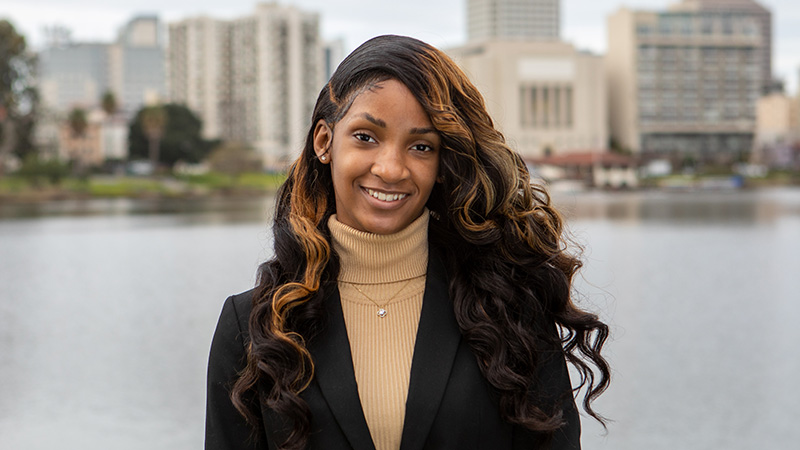First-Gen Bruin Engineer Strives to Make a Difference in Building a More Equitable Environment

Mia Irvin-Pollard was in seventh grade when she discovered her love for science after accepting a challenge from her father to fix a broken oven handle all by herself.
Now a third-year electrical engineering student at UCLA, Irvin-Pollard said she knew from a young age that she wanted to be the Black girl in science, technology, engineering and math to inspire others in her community.
Growing up in Oakland, California — a city in the heart of the Bay Area afflicted with violent crimes and drugs, Irvin-Pollard found the environment less than ideal despite her love of the neighborhood. “There were not a lot of people around me who were driven to reach for the stars, pursue higher education, or want a long-term career for themselves,” she said.
But Irvin-Pollard found her strength in faith and her father’s encouraging words.
“My dad would always tell me that my faith and knowledge is something that no one will ever be able to take away from me,” Irvin-Pollard said. “He always told me to strive for excellence in everything that you do and whatever you choose to do as your dream career, stick to what you are passionate about.”
Irvin-Pollard proved herself a high achiever. She was a straight-A student throughout elementary and high school, served as president of the student government and the Black Student Union during her senior year of high school, and was on the girls’ varsity track team.
At Oakland High School, Irvin-Pollard found a love for circuitry through her involvement in Project Lead the Way, an engineering-focused program that exposed her to coding, robotics and different engineering principles. The experience inspired her to pursue electrical engineering as a major in college, with the support and mentorship of her teachers.
Like many fellow prospective students applying for college during the peak of the COVID pandemic, Irvin-Pollard couldn’t tour campuses and had to rely on information she found on the internet. She got accepted to 32 colleges and chose the UCLA Samueli School of Engineering because of its outreach efforts and a scholarship from the UCLA Black Alumni Association.
“After I applied to UCLA, a lot of the black organizations reached out to me via email which was very welcoming and made me feel at home already,” Irvin-Pollard recalled. She also applied and was accepted to the Center for Excellence in Engineering and Diversity (CEED), a UCLA Samueli program that offers academic support, scholarships, research experience, and professional and leadership development for its admitted students.
Upon arriving at UCLA, Irvin-Pollard found her home away from home in the National Society of Black Engineers (NSBE) at UCLA.
“I knew once I got out of high school that I aspired to become a project manager so I can advocate for a more eco-friendly and energy-efficient environment for all — no matter their demographics or financial hardships,” Mia Irvin-Pollard said.
Since joining the student organization her freshman year, Irvin-Pollard has gone on to take multiple leadership roles, including being the secretary and senator. As the senator, she has helped educate members on the importance of voting at the NSBE regional and national conferences.
One of her proudest moments at NSBE was raising enough funds to send 20 UCLA chapter members to the 49th Annual NSBE National Conference in Kansas City, Missouri, where they participated in a two-day career fair featuring more than 100 companies and colleges, workshops, and competitions designed to support their professional development and jump-start their career in engineering and technology.
She has also worked with the club’s pre-college initiative chair to create an autonomous car project that can solve a 3D maze on its own. Launched last fall, the team anticipates to complete the project this spring, which will give NSBE members — especially first-year students — more hands-on engineering experience.
Irvin-Pollard is now serving as the group’s external vice president, where her role consists of fostering and generating new relationships and partnerships with industry to provide informational sessions, day-in-the-life chats, mock interviews, resume tips and other networking opportunities.
“Both NSBE and CEED have played a huge role in my success at UCLA, and without them, I wouldn’t be where I am now,” Irvin-Pollard said.
Among all the classes she has taken, Irvin-Pollard said she has enjoyed her electromagnetism and circuit theory coursework the most.
“I really love the professor, Yang Zhang, for my EE10 (circuit theory) course because at the end of each lecture of teaching a new topic, he tells us how that is being used in the real world today and it reaffirms me why I’m going into this field and what makes it so amazing to me,” she said.
Outside of school, Irvin-Pollard has pursued opportunities for internships — the most recent being an engineering intern position she just started at the intake and controls engineering department in SoCalGas. Last summer, she also interned with the Port of Oakland, where she worked with both the civil and electrical engineering teams on a project to build charging stations for electric buses at Oakland International Airport. Irvin-Pollard researched what charging product would best suit the project and presented her findings to the team. She also gave feedback on the design process for the civil division, conducted site walks with other engineers and helped with automation for the inspection report.
As she looks ahead, Irvin-Pollard said she hopes to take on an undergraduate research opportunity in her senior year and pursue a master’s degree in electrical engineering after her undergraduate studies. Ultimately, she would like to work in a field related to power distribution and renewable energy.
“I knew once I got out of high school that I aspired to become a project manager so I can advocate for a more eco-friendly and energy-efficient environment for all — no matter their demographics or financial hardships,” Irvin-Pollard said.
